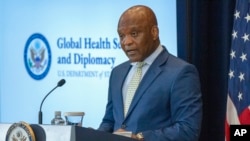The United States is making global health security a national security priority in 2024. “[W]e're going to elevate global health security as part of our foreign policy and diplomacy,” said Dr. John Nkengasong, Ambassador-at-Large, U.S. Global AIDS Coordinator and Senior Bureau Official for Global Health Security and Diplomacy (GHSD) in an exclusive interview. The recent creation of the new State Department Bureau is one of several acts the Biden Administration has taken to prepare to handle emerging health threats.
The outbreak of the COVID-19 pandemic showed that in an interconnected world, threats to public health have global consequences. COVID-19 “impacted trade, impacted housing, impacted economies and development in a way that we couldn't even imagine,” said Dr. Nkengasong.
“That tells you how close we are, the connectivity that we have with each other, the vulnerability that we have with each other in the world.”
To prepare for new threats that could spread globally in a matter of weeks, the United States will help its partners by supporting the “development, enhancement, and maintenance of effective global health security capacities through sustained political, financial, and technical support” according to a statement from the GHSD.
There are at least 50 countries that the United States is supporting to better “prevent, detect, and respond to infectious disease threats.” The United States must “maintain focus and develop platforms” in these partner countries, said Dr. Nkengasong.
“We're going to coordinate as much as possible ... and make sure that we lead by what I call the Four C's: We cooperate, we collaborate, we coordinate and we communicate with our partner countries there,” he said.
Another significant U.S. contribution to global health security is the Pandemic Fund, said Dr. Nkengasong. The fund is a partnership of donor countries and co-investors hosted by the World Bank that is focused solely on supporting pandemic prevention and response. The United States is currently the largest contributor to the Pandemic Fund and is actively working with partners to secure additional funding.
In the new year, the United States will continue to work to learn lessons from past pandemics and work with partner countries to develop global health capacity, said Dr. Nkengasong.
“A threat from anywhere in the world is a threat everywhere in the world.”






